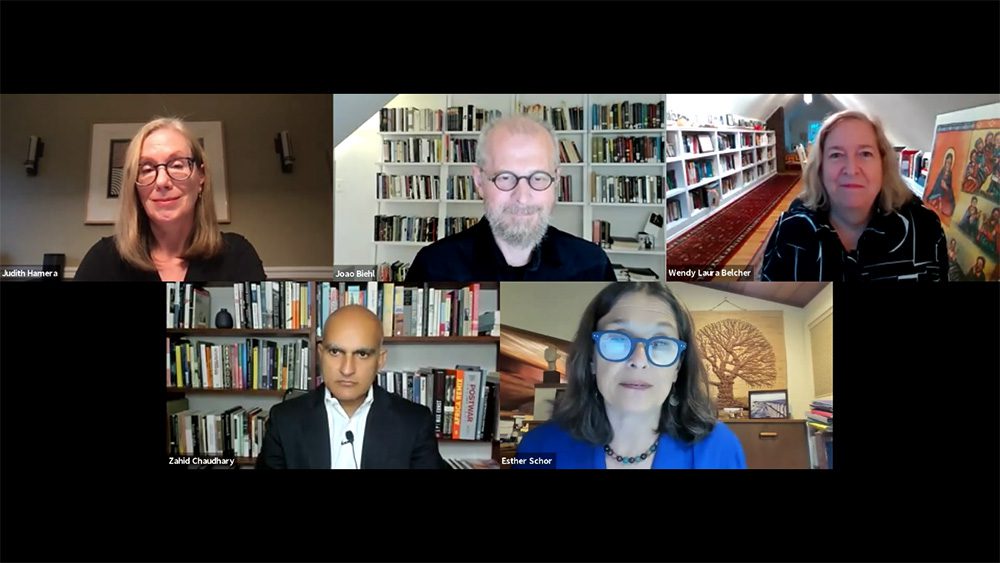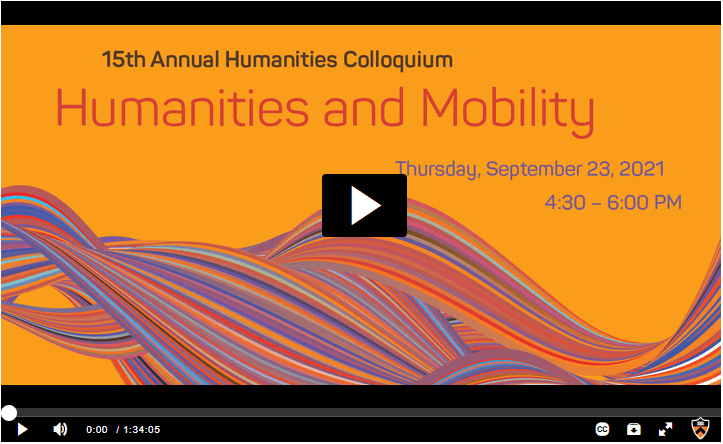By Lisa Kraege, Humanities Council
The Humanities Council held its 15th Annual Colloquium, about Humanities and Mobility, on Thursday, September 23. The Colloquium brings together the humanities community at Princeton to consider key issues within humanistic teaching and research.
Watch the full event here.
“Now that we’re beginning to emerge from an era of lockdowns, travel restrictions, quarantine, and self-isolation, our community returns to the concept and practice of mobility with fresh questions and new ideas,” moderator and Council Chair Esther Schor (English) said.
Wendy Laura Belcher (Comparative Literature, African American Studies), a 2021–2022 Old Dominion Professor at the Humanities Council, opened the Colloquium with “Are We Global Yet? Africa and the Future of the Humanities.” In response to the question in her title, Belcher supplied a definitive no. “How can we be,” she asked, when “too many have too many deep stereotypes against seeing the breadth and depth of African literature?” Belcher called for mobilization of the humanities, saying that the humanities will never be “global” until people overcome misconceptions about written African literatures preceding the arrival of Europeans.
Belcher gave a brief introduction of five pivotal early African texts: The Life and Struggles of Our Mother Walatta Petros, written in 1672 by the Ethiopian monk Gälawdewos; “The Ocean of Tears,” a poem written by Muhammad Awzal in 1714; the poetry of the woman scholar Nana Asmaˀu of West Africa, who lived in the early 1800s; an epic poem written by Sayyid Abdalla bin Ali bin Nasir in Swahili in 1750; and a story composed in Nsibidi script, written in Southern Nigerian by the Efik people in the 1770s, about a love affair.
According to Belcher, building a truly global canon begins with appreciating such materials. “We need to study these early African texts, translate these texts, and teach these texts to illuminate a part of our collective human knowledge that has been overlooked for centuries,” she said.
João Biehl (Anthropology), director of the Brazil LAB, spoke next, on “Transported by the Humanities of the Unlettered.” Biehl expressed an “oblique call to envision movement differently,” especially “in places of seeming stasis,” like Vita, an asylum in southern Brazil where the ill and unwanted are left to perish. Using images of Caterina, a woman who appears in his book Vita: Life in a Zone of Social Abandonment, alongside images of her notebooks, in which she transcribes what led her to Vita, Biehl championed a more mobile humanities.
“The humanities of those dismissed as unschooled and unlettered reveal forms unbounded and uncaptured by memory, historicism, or conventional ways of knowing,” he said.
Turning to his own life, Biehl recalled the legacy of his family among the German immigrants who settled in Brazil in the nineteenth century. He reflected on their connection to the Muckers, often isolated members of that same community who, lacking adequate medical care, followed prophetic local healers. He hailed stories that double as portals, to “invoke survivals that dwell in the smallest movements, reflections, and vibrations.”
Zahid Chaudhary (English) delivered “On the Mobility of Lies, Big and Small.” Taking up exceptionally mobile lies that have dominated our digital landscape in the past year, such as the lie that the 2020 election was stolen, or the lie that vaccines are implanted with a microchip, he posited that lies index our shared social and political world.
Chaudhary outlined the two main ways that lies spread virally: technological advancements in data management, and neoliberal governments’ prioritization of corporate interests over public. However, these explanations miss what the humanities are poised to do, he said: “analyze the truth that appears in the form of the lie.”
Guided by Hannah Arendt’s ordering of truth and falsehood, Chaudhary pointed to enduring hostility between truth and politics. This conflict means that “reading” lies forms a necessary part of humanistic study.
“The humanities can provide us with key insights into the operations of lies by taking into account the contradictions and discontinuities of all experience, including political experience,” Chaudhary said. “Lies and disinformation stabilize specific forms of being, reduce or seemingly expand the scope of political participation, reorient the place of cultural and epistemic authority, and themselves, even as lies, are oriented toward an imagined future.”
2021–2022 Old Dominion Professor in the Humanities Council Judith Hamera (Dance, American Studies) spoke next, on “Unruly Humanists, Moving Selves.” She likened the present moment to the early and mid-90s, citing the HIV/AIDS pandemic, the Rodney King riots, and activist demands for greater diversity and equity in government, the academy, and the art world, as parallel events to those of the last year and a half.
Hamera identified autobiography as a particularly mobile genre at the time, with projects arising from both academics and artists. Taking up the latter, she spoke about Guillermo Gómez-Peña, a member of Highways, a southern California performance collective. While academics tended to write formally conservative autobiographies, sometimes with unruly content, artists like Gómez-Peña “brought this same unruliness to the generic ‘autobiographical pact,’ producing critical antiracist conceptions of the autobiographical self in the process.”
Performances like Gómez-Peña’s critiqued the structures that produced and governed his current moment, just as autobiographies will prove crucial to understanding our own moment, Hamera said. “If anything, the autobiographical self is even more central to our social imaginary in this period of reckoning, and its potential in fashioning a diverse inclusive humanities even more deserving of our attention.”
After the panel, Kathleen Crown, Executive Director of the Council, relayed questions from audience members and helped moderate a Q&A session. The event closed with a discussion about the relationship between storytelling and audience, along with the possibility of transforming reading practices and institutions. The recording of the Colloquium can be viewed here or by clicking on the below.

















